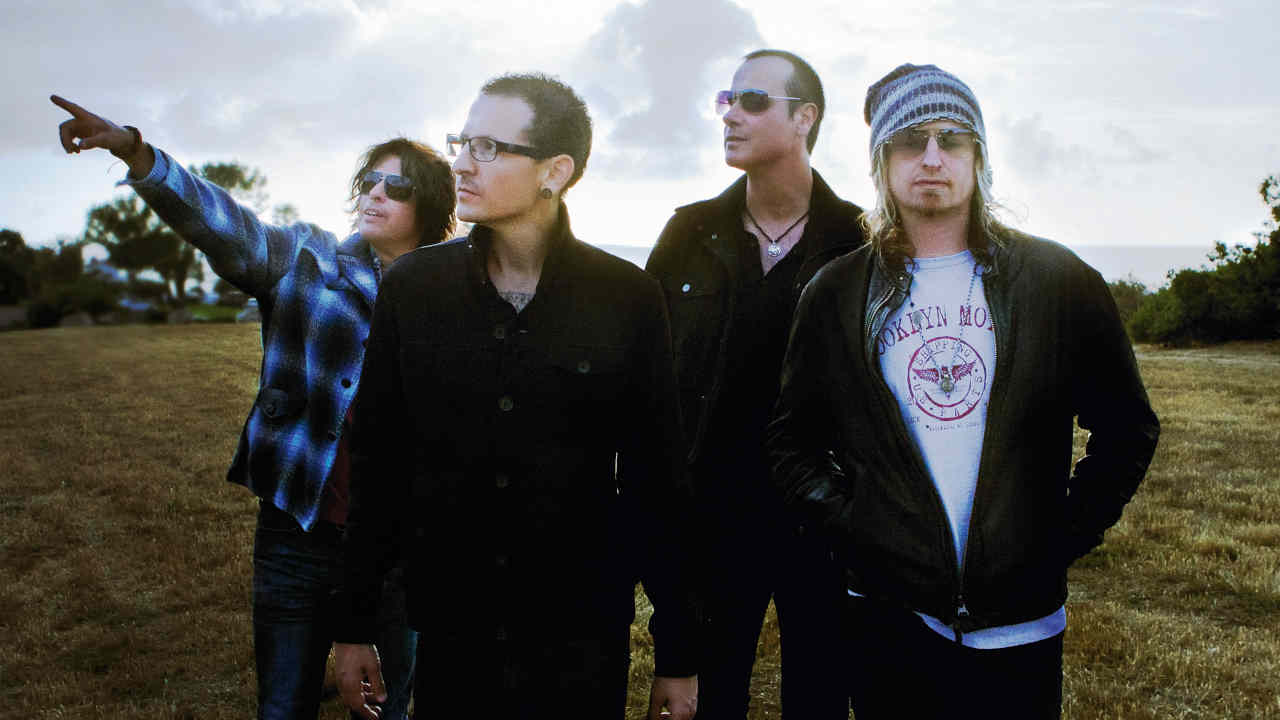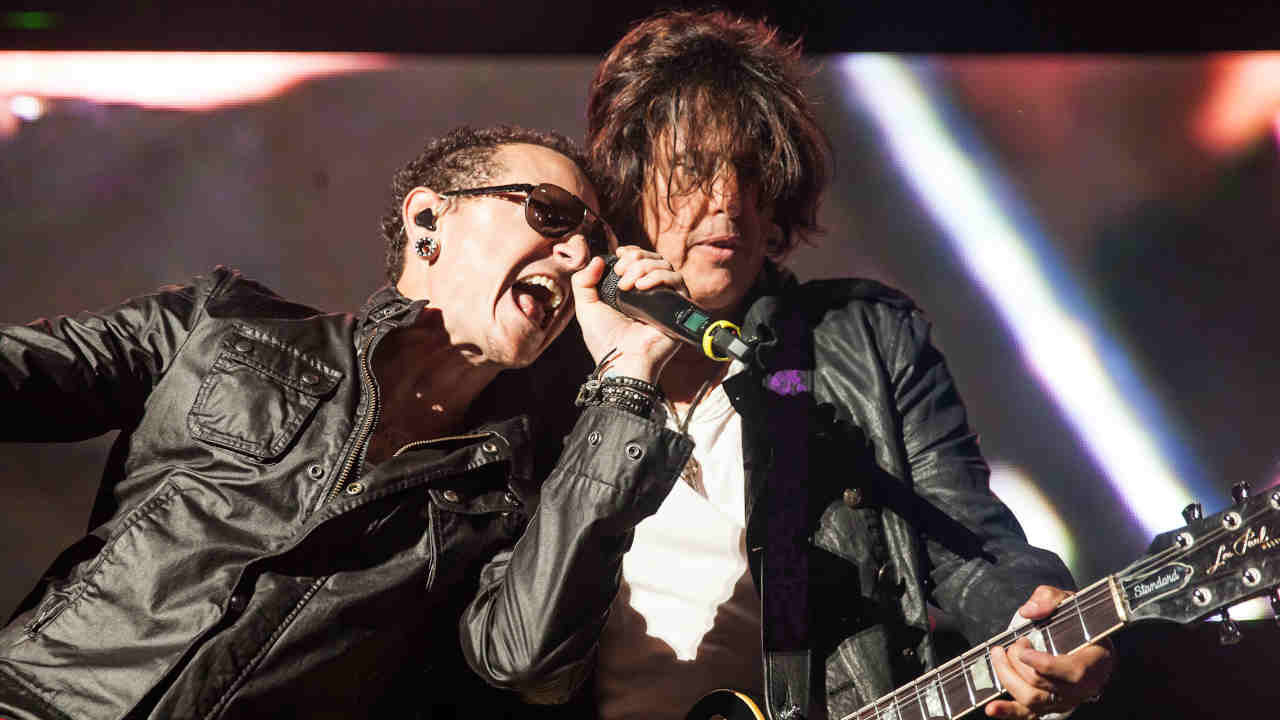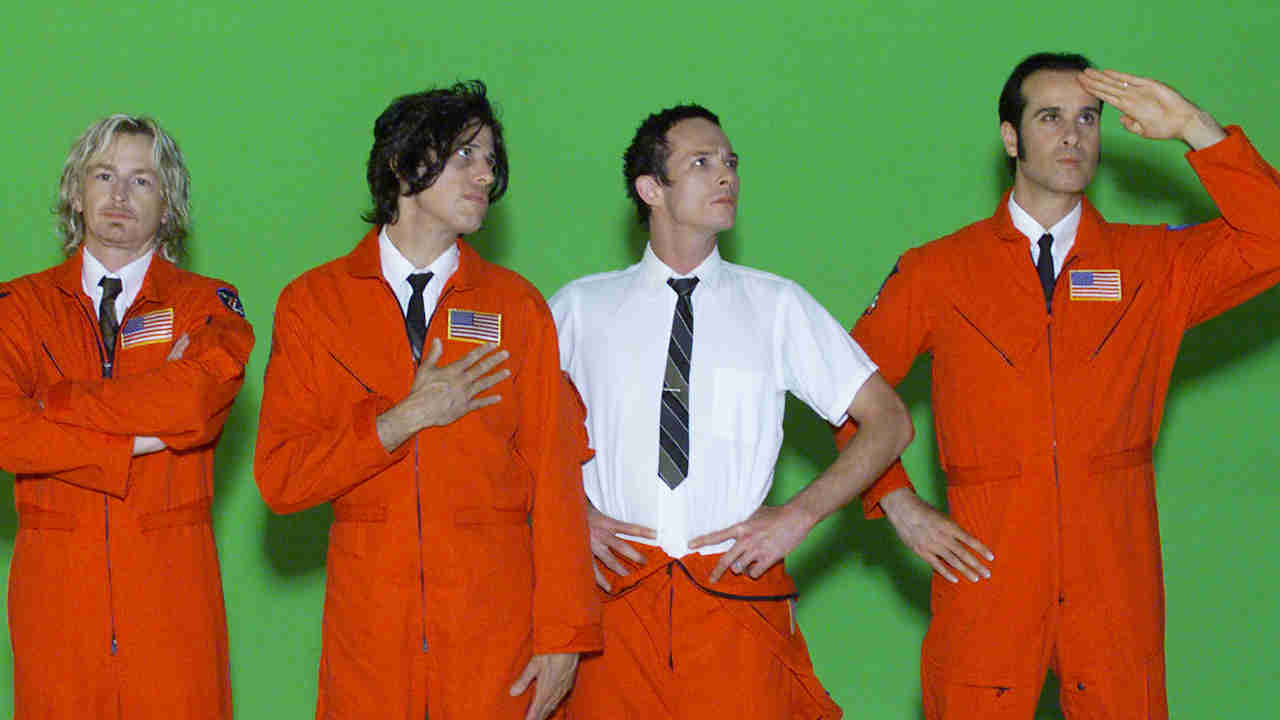
Few bands had such a rollercoaster career as Stone Temple Pilots, much of it due to the erractic behaviour of mercurial frontman Scott Weiland, who died in 2015. In 2013, following yet another split with Weiland, the band enlisted a surprise replacement: Linkin Park frontman Chester Bennington, who appeared on that year’s High Rise EP. On the eve of the EP’s release, Classic Rock talked to the band and Bennington – who passed away in 2017 - about rebooting one of alternative rock’s biggest bands.
The point of no return for Stone Temple Pilots came on 17 September, 2012. After three months of hit-and-miss performances with vocalist Scott Weiland, the band were scheduled to play in Abbotsford, British Columbia. Weiland arrived at the venue almost two hours late and stumbled his way through a shortened set. The group cancelled the next night’s gig in Lethbridge, Alberta without a proper explanation. By the time the group returned to the road for the last three dates the die had been cast. Guitarist Dean DeLeo, bassist Robert DeLeo and drummer Eric Kretz decided to find a new singer.
“We were left in a position where we went: ‘Okay, what do we do?’ says Robert. “Those shows were the accumulation of everything that had come together for many years. it was a very, very difficult decision to make.”
Three months later, a DJ in Minneapolis asked Velvet Revolver guitarist Slash about Weiland’s recent comments about being “completely open” to rejoining that band. “That’s because he got fired from STP,” responded Slash.
Reports of Weiland’s dismissal were all over the internet. In an interview with Rolling Stone in February, Weiland insisted he was still in the band. But the next day STP issued a short statement: “Stone Temple Pilots have announced they have officially terminated Scott Weiland.” On 18 May the band unveiled his replacement: Linkin Park’s Chester Bennington.
Today, with litigation pending about who owns the band’s name and whether the members of STP had a legal right to fire Weiland, Dean and Robert DeLeo are reluctant to reveal what specific incidents led them to “terminate” Weiland and bring in Bennington. They choose their words carefully when asked about their relationship with their ex-frontman, though they’re clearly still bitter about the endless frustration and trauma he allegedly caused during their 20-plus year career.
“Everybody only got a glimpse of what was really going on,” says Dean. “The inside was dark, man. And the last couple years it was impossible to get anything done. There was a 50/50 shot whether Scott was even gonna show. And then there was a 50/50 shot of who I was gonna get.”

Those unfamiliar with the band might ask why they didn’t replace him long ago. The answer is simple. In his prime, Weiland was as much STP’s hero as he was their Achilles heel. Despite a rampant heroin habit that raged from 1994 until 2002, they were one the most successful rock bands of the 90s, and even when their singer was out of his mind he was one of the most dynamic frontmen, with a voice to rival Eddie Vedder.
But while Weiland was the band’s showman, the DeLeos were the men who ran the show, crafting songs that drew from Led Zeppelin, The Beatles, Motown and grunge. Many critics dismissed STP as Pearl Jam wannabes, but the public didn’t agree; the band’s 1992 debut, Core, sold more than eight million copies, and before their first break-up in 2003 they’d sold 40 million records worldwide.
Despite the band’s success, their progress was hampered almost from the start by Weiland’s habits. In 1995 he was arrested for buying crack cocaine. Though he avoided jail, his addiction worsened, and in 1997 STP had to cut short a tour short because he was too far gone to perform.
“I lived with this false hope that he was one day gonna get it together,” Dean admits. “I kick myself today because we let it go on so long.”
They gave Weiland another chance in 1998 and hung together for the next few years. But the Pilots fell from the sky once again during a 2002 tour. Fed up with Weiland’s missteps, the DeLeos vowed they were through, and even titled a 2003 greatest hits compilation Thank You as a final gesture to their fans.
“The story of my career is constantly wanting to take STP to new levels,” Robert laments, “but we constantly had to hold back.”
Despite everything, the band kept trying, and invited Weiland back one more time in 2007 at the request of his then-wife. Never one to leave bridges unburned, Weiland vacated Velvet Revolver under less than friendly circumstances and Stone Temple Pilots scheduled a 65-date tour of North America.
The DeLeos were optimistic when they went into production for their self-titled sixth album, which came out in 2010. But the problems that reared their heads during recording became uglier on the road, even though Weiland was reportedly clean. When the singer slipped into full Axl Rose mode, the other members decided they needed a major change.
“It wasn’t only a decision to terminate my lead singer, it was a quality of life decision,” Robert says. “I look at what STP has done – or hasn’t done – in the past 10 years. I don’t want the next 10 to be like that.”

The first time Chester Bennington saw Stone Temple Pilots live was in 1993 at the Arizona State Fair in his home town Phoenix. Core was one of Bennington’s favourite records. The night turned out to be a pivotal moment for the teenager.
“Scott came out wearing flannel,” he recalls today. “During the second song he tore the flannel off and said: ‘We’re not from fucking Seattle!’ And they rocked so hard. I looked at that and thought, ‘Fuck, I want to be able to do that.’”
It was the first of many times that Bennington saw them in the 90s. By 2001 he was even sharing a stage with them when Linkin Park and Stone Temple Pilots both appeared on the Family Values tour. When things crossed a line with Weiland, the DeLeos contacted Bennington via mutual friends and asked him if was interested in joining the band he’d grown up idolising.
“I said yes, immediately. And then I suddenly felt like, ‘Oh, I’m gonna puke a little bit,’” Bennington admits.” I was nervous, but also really excited.”
The group started tossing around ideas for new songs. “There were great riffs bouncing around and a lot of chemistry,” Bennington says. “We got each other’s personalities, and we were all having a blast.”
“There’s a certain magic that happens when Robert, Eric and I get in the room and start playing,” adds Dean. “Chester fit right into that formula. Even though we hadn’t seen him in a long time, it was like he had been playing with us for 30 years. He had great ideas, and when we finally took a break and played some of the old catalogue for fun, he knew the songs.”
The first new song the band completed, the fist-raising anthem Out Of Time, came from a bass line Robert played on the spot while trying out some new equipment. In keeping with this spirit of spontaneity, they recorded the song and unveiled it on May18 at the annual LA radio festival, the KROQ Weenie Roast. Before Bennington took the stage, the audience was unaware he was STP’s new singer.
“During the first song, the band started playing the music for Vaseline,” Bennington recalls. “I was shaking my ass on the drum riser with my back to the crowd. I jumped and landed on the stage when the song started, and began to sing. People were screaming and they were super-stoked. I think I lot of them thought I was Scott. When they saw that I wasn’t, they were surprised, but I didn’t see or hear anything that indicated that maybe this was a bad idea.”
The next day STP released Out Of Time as a free download, and that night they played the Live 105 BFD festival near San Francisco. As exciting as it was to be back on stage, Stone Temple Pilots held off playing more shows so they could record an EP before August, when Bennington had to go into full-time rehearsals with Linkin Park.
“Dean, Eric and I felt like we could get more done with Chester in a few months than we could in a few years with STP before,” says Robert. “And we have.”
There’s some irony in the fact that STP have swapped one notoriously wayward singer for another who has had his own struggles with substances in the past. Bennington battled drink and drugs throughout his early career before cleaning up in 2005. The DeLeos are aware of Bennington’s story, and they’re confident history won’t repeat itself. “I’ve spent a lot of time around him, and I could tell right away that won’t be an issue,” Robert says. “I see what kind of a person he is.”
But there are bigger considerations than just chemical ones. Bringing on board an established singer with his own successful band could bring its own set of problems, especially as this union looks like it will be semi-permanent. Bennington is aware of the pitfalls of juggling two bands at once – Linkin Park are working on the soundtrack to the upcoming movie Mall, as a well as their own new studio album. The singer has the cautious support of his Linkin Park bandmates, though their concerns seem more to do with workload than jealousy.
“This is the first time when one of us has said: ‘Hey, by the way, I’m going to do this thing on the side and it’s one of the biggest things out there,’” he says. “Understandably, they’re concerned that I’m stretching myself too thin. They were like: ‘Look, we support this, but we also know you’re not gonna just want this to be something that you do. You’re going to want this to be big.’ I just have to remember I’m only one person so I have to be smart.”
Given Bennington’s limited availability to STP, there’s a question that begs to be answered: once the legal issues are ironed out, what if a healthy, happy Weiland wants to return to Stone Temple Pilots?
“No way, man,” says Robert. “That boat has sailed.”
Dean DeLeo agrees. “We’ve tried that again and again,” he says. “It’s about time we started enjoying our career and having a good time with it, as opposed to just worrying about everything all the time and trying to uphold another dude’s integrity. I want to enjoy this, man, and it hasn’t been enjoyable for a long, long time. When I go into a session now where I’m being affiliated with Chester, it’s a huge, huge beast off my back. I sleep much better at night.”
Originally published in Classic Rock issue 189







